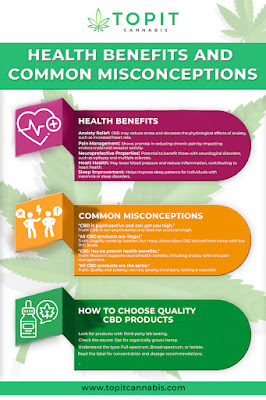Cannabis (CBD) has gained significant attention for its potential health benefits, leading to widespread use in various forms, including oils, capsules, gummies, and topical creams. It's important to separate the scientifically supported benefits from common misconceptions. Below is an overview of both aspects:
Health Benefits of CBD
1. Anxiety and Depression Management: Several studies suggest that CBD may have anxiolytic effects, potentially helping reduce anxiety levels and symptoms of depression. It's thought to interact with serotonin receptors in the brain, which play a role in mood regulation.
2. Pain Relief: CBD may help reduce chronic pain by impacting endocannabinoid receptor activity, reducing inflammation, and interacting with neurotransmitters. It's been explored for conditions like arthritis and multiple sclerosis.
3. Neuroprotective Properties: There's growing interest in CBD's potential to benefit those with neurological disorders, such as epilepsy and multiple sclerosis. Notably, Epidiolex, a CBD-based medication, has been approved by the FDA for treating certain types of epilepsy.
4. Sleep Improvement: Some users report better sleep quality with CBD. This could be indirectly related to its effects on anxiety and pain, which might otherwise interfere with sleep.
5. Anti-inflammatory Effects: CBD has been shown to have anti-inflammatory properties, which could benefit skin conditions like acne or psoriasis when applied topically.
Common Misconceptions about CBD
1. CBD Gets You High: One of the most prevalent misconceptions is that CBD is psychoactive like THC (tetrahydro cannabinol), the compound in cannabis that causes a high. CBD is non-psychoactive and does not induce a high.
2. All CBD Products are the Same: The quality, potency, and purity of CBD products can vary greatly between brands and products. Factors such as the source of the hemp, extraction method, and the presence of other ingredients can significantly affect the product's safety and efficacy.
3. CBD Is a Cure-All: While CBD has shown promise in several areas, it is not a panacea for all health issues. More research is needed to fully understand its effects and potential applications.
4. No Side Effects: Although CBD is generally well-tolerated, it can cause side effects in some individuals, such as fatigue, diarrhea, and changes in appetite or weight. It may also interact with certain medications.
5. Immediate Results: Some people expect immediate or dramatic effects from CBD. However, its effects can be subtle and may take time and consistent use to become evident.
When considering CBD for therapeutic purposes, it's crucial to consult with a healthcare provider to ensure it's appropriate for your situation and to discuss potential interactions with other medications. Also, due diligence in researching and selecting high-quality CBD products is essential to ensure safety and effectiveness.





No comments:
Post a Comment